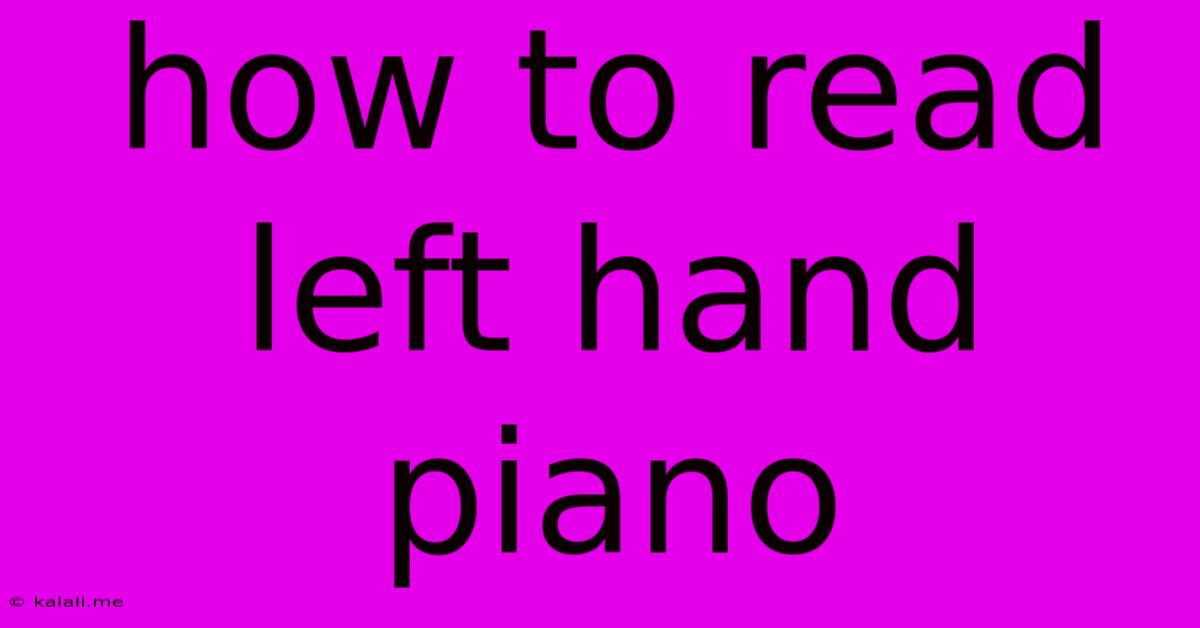How To Read Left Hand Piano
Kalali
May 31, 2025 · 3 min read

Table of Contents
How to Read Left Hand Piano: Mastering the Bass Clef and Beyond
Reading left-hand piano music can feel daunting at first, especially if you're used to focusing solely on the right hand's melody. But mastering the bass clef and understanding left-hand rhythms and techniques is crucial for playing complete and expressive piano pieces. This guide will break down the process, providing tips and techniques to help you confidently read and play left-hand piano parts.
Understanding the Bass Clef: The bass clef, often called the "F clef," is the key to understanding left-hand piano notation. Unlike the treble clef (used for the right hand), the bass clef's shape indicates the location of the F note on the staff. Learning to quickly identify notes within the bass clef is the first step in mastering left-hand piano reading. Practice identifying notes visually and then playing them on the piano keyboard. Use flashcards or online resources to aid your memory.
Essential Skills for Left-Hand Piano Reading:
-
Note Recognition: Fluent note recognition in the bass clef is paramount. Start with recognizing notes on the lines and spaces, then gradually expand your skill to encompass ledger lines (notes extending above or below the staff). Consistent practice is key to building this skill.
-
Rhythm Reading: Understanding rhythm notation is essential for both hands. Practice reading various note values (whole, half, quarter, eighth, sixteenth notes, etc.) in the bass clef. Use a metronome to improve your timing and accuracy. Focus on keeping a steady beat, even when playing complex rhythms.
-
Chord Recognition: The left hand frequently plays chords, providing the harmonic foundation for the piece. Learning to quickly identify common chords (like C major, G major, A minor) written in the bass clef is vital. Practice inversions of chords to further solidify your understanding.
Tips and Techniques for Efficient Reading:
-
Chunking: Don't try to read the entire left-hand part at once. Break the music into smaller, manageable chunks (phrases or sections). Practice each chunk individually before putting them together.
-
Hand Coordination: Practice coordinating your left and right hands. Start slowly and gradually increase the tempo as your coordination improves. Use a metronome to maintain a consistent tempo and ensure both hands play together smoothly.
-
Visual Training: Regularly sight-read simple pieces in the bass clef. Even short exercises can significantly improve your reading skills. Focus on accuracy over speed initially.
-
Listening and Analysis: Listen to recordings of the piece you're learning. Pay close attention to the left-hand part, noticing its rhythm, dynamics, and harmonic role. Analyze the score to understand the relationship between the left and right hands.
Moving Beyond the Basics:
Once you have a firm grasp of basic note reading and rhythm in the bass clef, you can begin to explore more advanced techniques:
-
Arpeggios: Practice playing arpeggios (broken chords) smoothly and evenly in the left hand. This will improve your dexterity and coordination.
-
Scales: Mastering scales in the bass clef will improve your finger dexterity and knowledge of note relationships.
-
Improvisation: Experiment with improvising simple bass lines over chords. This will build your musical understanding and creativity.
Resources and Practice:
Numerous online resources and piano method books offer exercises specifically designed to improve left-hand piano reading. Focus on consistent practice, breaking down complex sections into smaller, manageable pieces, and always strive for accuracy before increasing speed. Remember, patience and perseverance are key to success. With dedicated practice and the right approach, you'll master reading left-hand piano music and unlock a new level of musical expression.
Latest Posts
Latest Posts
-
Woman Dresses In All Black Meaning Religion
Jun 02, 2025
-
Out On No Longer A Fan Of
Jun 02, 2025
-
How To Renege An Internship Offer
Jun 02, 2025
-
Hey Big Guy Suns Getting Real Low
Jun 02, 2025
-
Valid Argument Schemata Are Not Satisfiable
Jun 02, 2025
Related Post
Thank you for visiting our website which covers about How To Read Left Hand Piano . We hope the information provided has been useful to you. Feel free to contact us if you have any questions or need further assistance. See you next time and don't miss to bookmark.